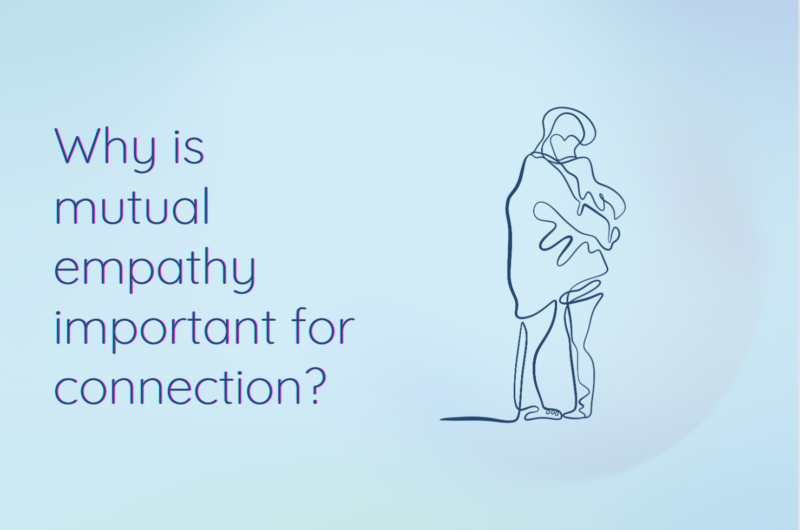Why is mutual empathy important for connection?
Roamers Therapy | August 2023
Oftentimes, we may get stuck in relational patterns that promote disconnection or isolation. For example, we might not feel safe engaging in conflict with a certain friend so we keep our feelings to ourselves and avoid bringing up how we feel. Or maybe a relationship is consistently energy draining instead of energizing. Or maybe we don’t feel accepted as our full, authentic self in a relationship. We can all easily find ourselves in these scenarios which is why it is important to sometimes do a relational “check-in” to help ourselves engage in healthier, more fulfilling connection.
Mutual empathy describes an experience between two people in which each person is affected by and sees their impact on the other, allowing for them to recognize possibilities for change and connection. When we feel seen and are able to fully see others, it can disrupt patterns of disconnection and open the door for growth. For example, in an interaction with a romantic partner, it means you are both practicing empathy at the same time as opposed to one partner focusing their energy on the other.
It could mean having a conversation with your partner about your needs where you both express what you need from the other and leave the conversation feeling heard and with a better understanding of what your partner needs. We can begin feeling more comfortable sharing ourselves with others, more supported, and more open to change when mutual empathy is present in a relational dynamic. Growth-fostering relationships and connection require this intentional reciprocity to be sustained. When one side of a relational dyad is doing all of the giving, it begs the question of how that relationship will continue to thrive in the long term.
Mutual empathy is also important for repairing connection or our ability to connect. Our prior relational experiences, whether it be what we learned in childhood or from a past partner or friendship, can create relational expectations. When these relational expectations lead to pain, disconnection, or empathic failure in our current relationships, practicing mutual empathy opens the door for us to alter and shift these ingrained relational patterns and expectations. To experience mutual care and responsiveness with someone in a way you are not used to may allow you to grow beyond what you thought was possible for you in relationship.
A true, reciprocal connection through mutual empathy can also teach us more about ourselves. We can learn about ourselves through learning and understanding others. Therefore, when we bring our fullest selves into new relationships, we are more equipped to practice mutual empathy and strengthen that connection we desire. Society teaches us to be independent and measures success by our ability to make it on our own. But what if we reframed that expectation? What if the best source for personal growth is actually through connection? Practicing mutual empathy allows us to try.
At Roamers Therapy, our psychotherapists are here to support you through anxiety, depression, trauma and relationship issues, race-ethnicity issues, LGBTQIA+ issues, ADHD, Autism, or any challenges you encounter. Our psychotherapists are trained in Cognitive Behavioral Therapy, Dialectical Behavioral Therapy, Psychodynamic Therapy, Acceptance, and Commitment Therapy, Person-Centered Therapy, and Gottman Therapy.
Whether you’re seeking guidance on a specific issue or need help navigating difficult emotions, we’re ready to assist you every step of the way.
Contact us today to learn more about our services and schedule a session with our mental health professionals to begin your healing journey. To get started with therapy, visit our booking page.
First, decide if you’ll be paying out-of-pocket or using insurance. If you’re a self-pay client, you can book directly through the “Book Now” page or fill out the “Self-Pay/Out-of-network Inquiry Form.” If you’re using insurance, fill out the “Insurance Verification Form” to receive details about your costs and availability. Please let us know your preferred therapist. If your preferred therapist isn’t available, you can join the waitlist by emailing us. Once your appointment is confirmed, you’ll receive intake documents to complete before your first session.
This page is also part of the Roamers Therapy Glossary; a collection of mental-health related definitions that are written by our therapists.
While our offices are currently located at the South Loop neighborhood of Downtown Chicago and Lakeview on Chicago’s North Side, Illinois, we also welcome and serve clients for online therapy from anywhere in Illinois and Washington, D.C. Clients from the Chicagoland area may choose in-office or online therapy and usually commute from surrounding areas such as River North, West Loop, Gold Coast, Old Town, Lincoln Park, Rogers Park, Logan Square, Pilsen, Bridgeport, Little Village, Bronzeville, South Shore, Hyde Park, Back of the Yards, Wicker Park, Bucktown and many more. You can visit our contact page to access detailed information on our office location.

